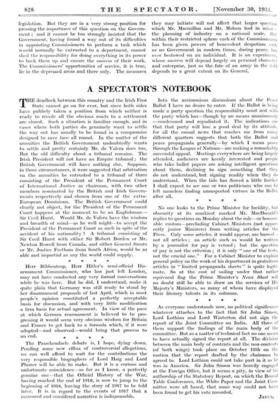A SPECTATOR'S NOTEBOOK
r deadlock between this country and the Irish Free ntate cannot go on for ever, but since both sides have publicly taken a position from which neither is ready to recede all the obvious roads to a settlement are closed. Such a situation is familiar enough, and in cases where both parties do genuinely want to settle the way out has usually to be found in a compromise designed to save face all round. In the matter of the annuities the British Government undoubtedly wants to settle and pretty certainly Mr. de Valera does too. But the old difficulty about a tribunal remains. The Irish President will not have an Empire tribunal ; the British Government will have nothing else. Suppose, in those circumstances, it were suggested that arbitration on the annuities be entrusted to a tribunal of three consisting of the President of the Permanent Court of International Justice as chairman, with two other members nominated by the British and Irish Govern- ments respectively and chosen from one of the extra- European Dominions. The British Government could clearly not object, for the President of the Permanent Court happens at the moment to be an Englishman— Sir Cecil Hurst. Would Mr. de Valera have the wisdom and breadth of mind—as he well might—to accept the President of the Permanent Court as such in spite of the accident of his nationality ? A tribunal consisting of Sir Cecil Hurst with either Sir Robert Borden or Mr. Newton Rowell from Canada, and either General Smuts or Mr. Justice Feetham from South Africa, would be as able and impartial as any the world could supply.
* *










































 Previous page
Previous page